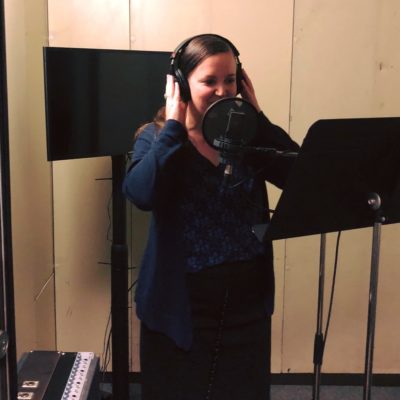| 00:00 |
ShortCuts Theme: |
[Piano Overlaid With Distorted Beat]
|
| 00:09 |
Hannah McGregor: |
Welcome to SpokenWeb ShortCuts. Each month on alternate fortnights (that’s every second week following the monthly SpokenWeb Podcast episode) join me, Hannah McGregor and our minisode host and curator, Katherine McLeod for SpokenWeb’s ShortCuts mini-series. We’ll share with you, especially curated audio clips from deep in the SpokenWeb archives to ask, what does it mean to cut and splice digitally? What kinds of new stories and audio criticism can be produced through these short archival clips? An extension of the ShortCuts blog posts on spoken web blog, this series brings Katherine’s favourite audio clips each month to the SpokenWeb Podcast feed. So if you love what you hear, make sure to head over to SpokenWeb.ca for more. without further ado. [End Music: Piano Overlaid With Distorted Beat] Without further ado, here is Katherine McLeod with SpokenWeb ShortCuts, mini-stories about how literature sounds. [SpokenWeb Podcast Theme Music: Instrumental Overlapped with Feminine Voice]
|
| 01:17 |
Katherine McLeod: |
Welcome to ShortCuts. Last time on ShortCuts, we were listening to recordings that made us think about and feel the emotional weight of archives. We were thinking about how archival recordings produce memories that can almost stand in for the lived memory itself. How does the archive remember? Is the archive, the archive as in the colonial archive, or is the archive something more attuned to embodied practice? And that understanding very much resonates with the most recent episode of the SpokenWeb Podcast, “Forced Migration.” That episode asks how stories are passed along in the case of bison migration. Artist and researcher Michelle Wilson mines colonial archives in order to create alternative stories of the human relations with the bison of Turtle Island. What do we call the collection of these stories, an archive, a community, and who do these memories serve? That is the question that will take us into the sounds of this ShortCuts, who do these memories serve.
|
| 02:34 |
Katherine McLeod: |
And here I’m thinking about Stó:lō writer and activist Lee Maracle’s book Memory Serves. On November 11th, 2021 Lee Maracle passed away… And I heard the news after finishing up the last ShortCuts and thinking about archival afterlives. I listened to all the tributes pouring in for Maracle across various media outlets and media platforms. We’re still listening to those tributes and remembrances. Recordings of Maracle’s voice are in SpokenWeb audio collections. For example, if you recall the episode in season two of ShortCuts on Dionne Brand’s reading from 1988, you’ll recall that Lee Maracle had read with her that night. I had planned on a part two of that ShortCuts to listen to Maracle in that recording. And now is the time to listen. At the same time, like in the last episode, I encourage you to take care while listening…
|
| 03:35 |
Audio Recording, Lee Maracle, 1988 Reading: |
Tomorrow there’s a celebration of South Africa Women’s Day. And I was asked almost a year ago now, I think to do a poem for the boycott the shipments of sulphur from Vancouver harbour to South Africa. And I’m gonna read that one first.
|
| 03:59 |
Katherine McLeod: |
It is a reading that was broadcast on the radio program, radiofreerainforest. And that’s how we end up with this recording. That is the archive. But the experience of being there is archived in the sound in the cadence of voice, in the noise, in the background, in the laughter in knowing that the recording cannot remember it all. We won’t listen to the entire recording, but we will listen to enough clips that you get a sense of it. And if you’d like to return to it, you’ll know that it is there. The audio clips that we will hear are ones that convey the sound of the room, what it would’ve felt like to be there, how we can hear kinship, how we can hear the relation between bodies in the room. Like in this moment, when Maracle explains that she is going to read an epigram for Dionne Brand…
|
| 04:56 |
Audio Recording, Lee Maracle, 1988 Reading: |
This is for Dionne. [Laughter] She wrote this book called Winter Epigrams. You should all buy it if you get a chance [Laughter], it’s a great book of poems. But as you know, about 95% of Canada in the winter is covered in snow. So I answered her epigrams about the cold in this fashion. At that time, I hadn’t met Dionne, but I was supposed to read with her and, it never came to pass [Laughter]. Tonight is the first— [inaudible comment from Brand] [Laughter from Brand and Maracle] — and I wouldn’t these, but [Inaudible] [Shared Laughter]… This one’s called “Flowers for Dionne.” I hope I get it right!
|
| 05:46 |
Katherine McLeod: |
It feels as though we’re listening to a private moment that has found its way into a more formal archive. There are jokes about how they had planned to read together didn’t and now here they are — and that continues later, when in her reading Brand replies to Maracle with an unfinished epigram in response.
|
| 06:08 |
Audio Recording, Dionne Brand, 1988 Reading: |
Lee read the epigram back to me in Montreal. And I was very honoured too, that she had written it back to me and I’ve been trying to write her back an epigram. We might make a book [Audience Laughter]. So I haven’t got very far with the epigram except to say: “Write me out of this epigram, Lee, you are so much water. You are too much water, too much rock, so much eagle. Write me out of this epigram, Lee. I am so much bush, so much ocean, so much rage…” And that’s just the beginning. [Laughter] It’s not finished. [Clapping] It’s supposed to go and like “write us out of this goddamn epigram.” [Audience Laughter]. I want to read a couple poems about South Africa.
|
| 07:21 |
Katherine McLeod: |
Brand starts her reading after Maracle with a poem for South Africa. And that is exactly how Maracle had started hers. I am taking all of these audio clips out of their contexts, out of their linear order in which they would’ve been heard in the reading, but, in doing so, I’m trying to bring to the forefront, the connections that are embedded within it and the conversation happening between poets in the reading itself. Knowing the exchange that unfolds between Brand and Maracle about the epigrams, it becomes even more meaningful to hear what precedes it. And this is why I’ve taken all of that out of context, to build up to hearing this poem, a poem that Maracle introduces by saying that she wrote it for herself. Let’s now listen to Lee Maracle reading “Perseverance”…
|
| 08:16 |
Audio Recording, Lee Maracle, 1988 Reading: |
I once said that poetry is never a self-portrait, you know, poets are famous for writing for so and so and for so and so and for so and so… Well, I was feeling very narcissistic one day, and I decided this was for me. It’s called “Perseverance.”
|
| 08:34 |
Audio Recording, Lee Maracle, 1988 Reading: |
[Reading poem] There’s a dandelion on the roadside in Toronto, it’s leaves a dishevelled mix of green and brown. A dandelion straggling and limping along. There’s a flower beside a concrete stump on Bay Street in Toronto, perpetually rebelling against spiked heels and blue surge suits. The monetary March passed by five o’clock Bay Street, deaf to the cries of this thin ageing lion’s sneer. Chicken, yellow flower. My leaves, my face, my skin. I feel like my skin is being ripped off of me. There is a flower in Toronto on the roadside. It takes jack hammers and brutish machines to rip the concrete from the sidewalks in Toronto to beautify the city of blue suede suits. But for this dandy lion, it takes, but a seed, a little acid rain, a whole lot of fight, and a black desire to limp along and scraggle, forward. There is a flower. [Audience Laughter]
|
| 09:41 |
Audio Recording, Lee Maracle, 1988 Reading: |
This is for Dionne.
|
| 09:42 |
Katherine McLeod: |
That poem ends with the words, “There is a flower.” We can hear that those words are almost covered by the response from the audience — and, well, no, they’re not covered. It’s more that they’re supported by the sound. The sound holds them up. And that’s the moment that Maracle says, “This is for Dionne.” Listening again, I rushed to check a published version of the poem in I Am Woman to see that it ends with “There is a flower” because it really sounds like she says, “Here is a flower.” On the page, it says “There is a flower,” but I listen to it again. And it does sound like “here.” And thinking about it more, I thought, well, how beautiful would it have been? If she had said, “Here is a flower,” because she had said that this poem is for herself. To say, “here is a flower” is like saying a version of: “Here I am.” And that would make even more sense with how her audience responds. It’s as though she’s reached out her arms while saying it, and as though we can hear the warmth of the smiles and nods around her saying, yes, here she is. Let’s listen to that ending again…
|
| 10:52 |
Audio Recording, Lee Maracle, 1988 Reading: |
“…black desire to limp along and scraggle, forward. There is a flower. [Audience Laughter] This is for Dionne. [Lee Laughs] She wrote this called book called Winter Epigrams. You should all buy it if you get a chance. It’s a great book…
|
| 11:11 |
Katherine McLeod: |
That was Lee Maracle reading with Dionne Brand in 1988. The recording is part of the radiofreerainforest collection, which is part of SpokenWeb’s audio collections held at Simon Fraser University. If you are a SpokenWeb researcher with an audio clip for shortcuts, do get in touch at spokenwebpodcast@gmail.com. If you are listening and you were at one of the readings played here on ShortCuts, please do get in touch at the same email spokenwebpodcast@gmail.com. [Start Music: ShortCuts Theme Music]
|
| 11:42 |
Katherine McLeod: |
Shortcuts is mixed and mastered by Judith Burr, hosted by Hannah McGregor, transcribed by Kelly Cubbon, and produced by me, Katherine McLeod. Thanks for listening. |

